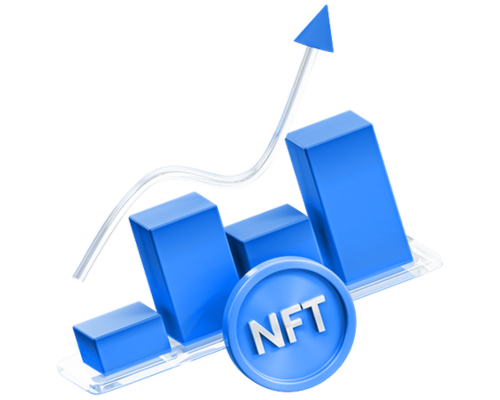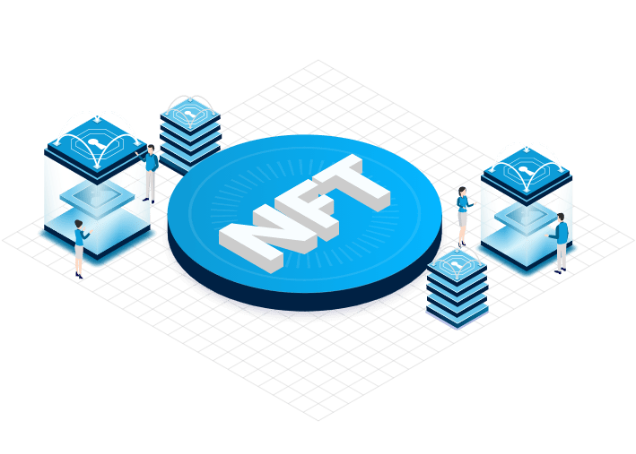
The increasing popularity of NFTs
NFTs (Non-Fungible Tokens) have rapidly gained popularity as they revolutionize the way digital assets are created, owned, and traded. Unlike traditional cryptocurrencies, each NFT represents a unique item, whether it's digital art, collectibles, music, virtual real estate, or in-game assets. The surge in interest is driven by creators, investors, and businesses recognizing the potential of NFTs to authenticate ownership and provide scarcity in the digital world.
As blockchain technology evolves, NFTs are becoming a crucial part of the decentralized economy, offering new revenue streams and creative opportunities for both individuals and enterprises.

NFT Development Service by CodeElevator
At CodeElevator, we specialize in offering comprehensive NFT development services, tailored to meet the unique needs of creators, businesses, and developers looking to enter the fast-growing world of non-fungible tokens.
From conceptualization to deployment, we help you build and launch NFTs that stand out in the marketplace.
- Designing Unique Digital Arts
- Minting Tokens on Blockchain
- Managing NFT Collections
Unleash new spectrum within your real-world asset ecosystem with our NFT development services
We empower businesses and individuals to tokenize tangible assets—such as real estate, art, luxury goods, and more—into secure, tradable NFTs.

Custom NFT Designs
Create unique and secure NFTs tailored to your project, whether it’s for art, gaming, real estate, or other sectors.

NFT Contract Development
We build robust, secure, and tamper-proof smart contracts to power your NFTs on blockchain platforms like Ethereum, Binance Smart Chain, Solana, and more.

Marketplace Integration
Seamless integration with popular NFT marketplaces, enabling you to list, trade, and auction your NFTs globally.

Token Standards Compliance
Support for leading token standards such as ERC-721, ERC-1155, and others, ensuring interoperability and scalability.

NFT Wallet Development
We also offer NFT Wallet Development to help your users securely store, manage, and trade NFTs with ease.

Cross-Chain NFT Solutions
Enhance the reach of your NFTs with cross-chain compatibility, allowing users to trade NFTs across multiple blockchains.
By bridging the gap between physical assets and the digital world, our services enable you to enhance liquidity, verify ownership, and create new value streams!
Whether you're looking to fractionalize ownership, streamline transactions, or create a marketplace for your assets, our NFT solutions are designed to unlock limitless potential and drive innovation in your ecosystem.
Our Approach For NFT Development
The NFT development process involves several key stages that transform your concept into a fully functional non-fungible token, ready for deployment on the blockchain. Here's an overview of the steps involved:

Conceptualization & Consultation
The process begins with understanding your vision and objectives for the NFT project. Whether you’re creating digital art, tokenizing real-world assets, or building an NFT-based platform, we work with you to refine the idea and outline the technical requirements.

Blockchain Selection
Based on your project’s needs, we help you select the most suitable blockchain network (e.g., Ethereum, Binance Smart Chain, Solana, Polygon). This decision depends on factors like transaction speed, cost, scalability, and the target audience.

NFT Design & Metadata Creation
Our team collaborates with you to design custom NFTs, focusing on the visual elements, asset attributes, and metadata (information that defines the NFT’s unique properties, such as its name, description, and traits). This ensures your NFTs are one-of-a-kind and recognizable.

Smart Contract Development
We develop secure, tamper-proof smart contracts that handle the minting, ownership transfers, and other functionalities of your NFTs. We ensure compliance with leading token standards like ERC-721, ERC-1155, or other relevant protocols.

NFT Minting
Once the design and smart contract are ready, the NFTs are minted (created) on the chosen blockchain. Each minted NFT is linked to its corresponding metadata and becomes a verifiable digital asset that can be traded, sold, or transferred.

Launch & Support
After successful testing, your NFTs are deployed to the blockchain and made available to the public. We provide post-launch support to ensure smooth operation and address any issues that arise.
Why Choose CodeElevator for NFT Development Service?
At CodeElevator, we prioritize the security and uniqueness of your NFT ecosystem by utilizing secure smart contracts and advanced blockchain protocols. Our scalable infrastructure is designed to support high transaction volumes and multi-chain compatibility, ensuring a seamless experience for both creators and users. With our end-to-end NFT development services, you can trust us to deliver fully customizable, user-friendly, and future-proof NFT solutions. We integrate the key features of leading NFT platforms while adding innovative functionalities that enhance performance, usability, and marketability of your NFTs.

Dedicated Support
Our team provides round-the-clock support, ensuring that any issues or questions are promptly addressed to keep your platform running smoothly.

Experienced Team
With years of expertise in blockchain and exchange development, our skilled developers create reliable, high-performance margin trading platforms tailored to your needs.

Standard Development Practice
We follow industry-standard development practices, ensuring secure, compliant, and scalable platforms with robust functionality and future-ready infrastructure.
Looking for development or collabration?
Unlock the full potential of blockchain technology and joint knowledge by requesting a price or calling us today.
Talk To Our Team
